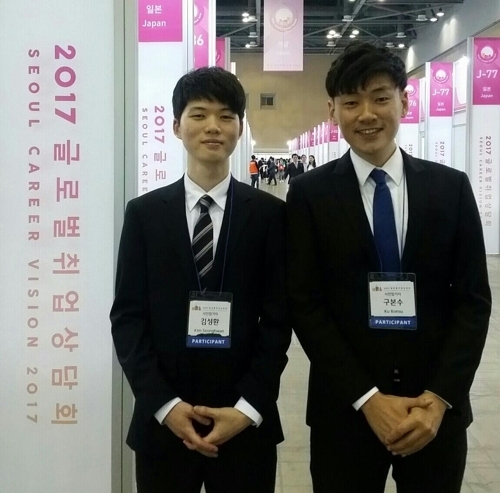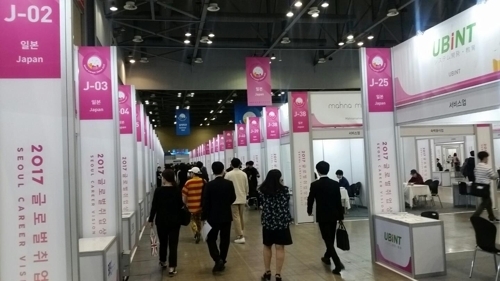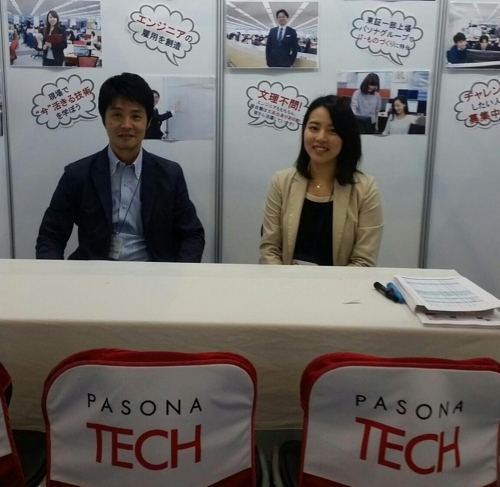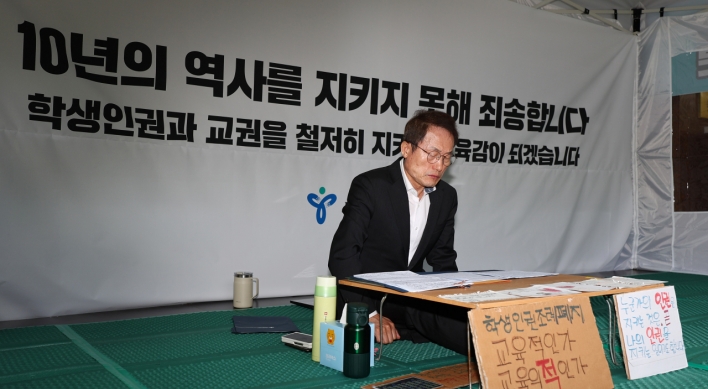For many old South Koreans, Japan has been an uncomfortable neighbor due to memories of Tokyo's harsh colonial rule over the Korean Peninsula in the first half of the 20th century.
But lingering resentment toward Japan is no longer an obstacle for a growing number of young jobseekers who are hard pressed to find work at home.
Ku Bon-su, a 30-year-old engineering graduate, had interviews with six Japanese companies in a job fair held in Ilsan, just northwest of Seoul, last week. He has turned to Japanese companies after experiencing difficulty in getting a job at local information-technology companies that have been shy to hire people amid sluggish economic growth. Ku learned Japanese while he worked at a noodle restaurant in Osaka for one year in 2015.

"I went to Japan for a breakthrough. I found Japanese companies short of workers and were eager to train inexperienced foreign jobseekers to work for them," Ku said in an interview with Yonhap News Agency after attending the job exhibition.
"I thought Japan could be the right place to start my career."
Japanese companies have an apprenticeship program for entry-level Korean workers with a yearly average salary of 32 million won ($28,500), which is lower than the pay offered for entry level employees at South Korean conglomerates, according to Choi Hee-sook, director general of the Human Resources Development Service of Korea.
But the wage level rapidly goes up depending on recruits' contributions to the company, she pointed out.

Young jobseekers' attempts to land jobs in Japan illustrated a trend among young people that the painful shared history with Japan is no longer a problem.
Older Koreans still vividly remember how they suffered during the Japanese colonial period (1910-45). They were forced to adopt Japanese names and banned from using their own language in schools.
Hundreds of thousands of Korean and other Asian women were forced into sexual slavery for Japanese soldiers during World War II -- one of the thorniest diplomatic issues between Seoul and Tokyo.
Kim Seong-hwan, a 25-year-old electrical engineering graduate, said there is no need to stick to a Korean company in the era of globalization. He had interviews with three Japanese firms last week.
"I don't want to join the group who spend years to pass an exam to become a government official. Ninety-eight percent of the applicants fail to make the cut each year," he pointed out, adding it's more worthwhile to find a job outside the country.

Last month, South Korea's jobless rate marked an 18-year high of 4.2 percent. The unemployment rate for young people, aged between 15 and 29, jumped to 11.2 percent from 10.9 percent a year earlier, according to Statistics Korea.
Reflecting such times, the Korea Trade-Promotion Agency (KOTRA), the Ministry of Employment and Labor and the Human Resources Development Service of Korea have joined forces under the "K-Move" project in 2013, to help young Koreans find employment overseas through job fairs, consulting and mentoring sessions.
Helped by the government-led programs, a total of 1,103 Korean graduates landed jobs in Japanese companies in 2016, nearly doubling from 632 a year earlier. The number of jobs in Japan accounted for 23 percent of the total 4,811 overseas jobs secured by young Koreans last year, KOTRA data showed.
"Korea's young graduates are preferred by Japanese companies as they work hard, are fluent in English or Japanese or both, and fully understand the Asian corporate culture," KOTRA Deputy Director Ryan Chae told Yonhap.
Japanese executives who came to the job fair to hunt out Korean talent mostly agreed with Chae's view.
"Engineers are in short supply in Japan so I want to secure talented Korean engineers (through this job fair)," said Suehisa Yaji, executive officer at Pasona Tech, a system engineer focused-recruiting company of Japanese leading human resources conglomerate Pasona Group.

Pasona Tech currently has two Korean engineers out of its 1,000 employees. It wants to add at least five to 10 Korean engineers through prearranged interviews.
Shinichi Funaki, a campus program manager at Amazon Japan, said the company joined the event to look for Japanese-speaking talent in South Korea. Amazon Japan is Amazon.com Inc.'s Japan unit.
"We don't mind about their (applicants') nationality, gender, background or other things. If we can find a very good person here, we (will) just ask them to join us."
Recruiters from other countries acknowledged that South Koreans are preferred as they are extremely hard working and complete demanding projects on time.
Shaheen Ashraf, recruitment specialist at ASTAD which manages construction projects in Qatar, said the company came to hire "the individuals who have expertise and experience working on stadium, metro and other infrastructure projects."
Qatar Finance Minister Ali Shareef Al-Emadi said in February the country will spend over $200 billion on stadiums, roads, a new airport and hospitals to ensure that it is prepared to host the 2022 World Cup.
In the eighth biannual job fair that began in 2014, some 200 multinational companies from 18 countries participated with an aim to fill 505 job positions with talented and hard-working Koreans, KOTRA said.
Of them, 91 companies were from Japan which is struggling with an aging population. Among them were Nissan Motor Corp., heavy industry company IHI Corp., business platform provider SoftBank Technology Corp. and hotel chain Hilton Fukuoka Sea Hawk.
Japan had a population of 127 million in 2015 and 27 percent of them were aged 65 or older. Its working-age population has been in decline since 1995, with the government expecting it to fall to 76 million this year and to 45 million by 2065, official data showed.
Desperate to overcome the country's growing shortage of labor, some companies look overseas to hire talent and some are employing robots to replace human workers. More than 90 percent of Japan's companies are small- and medium-sized.
Nam Yun-ha, 34, who assists the overseas sales department at Osaka-based plasma generator company Adtec Plasma Technology Co., said she moved to Japan seeking "right and fair" treatment for her advanced language capabilities.
Nam studied international economics at Ritsumeikan University in Kyoto and came back to Seoul in 2011 to work for a Korean company. But the Korean native, expert in Japanese and English, decided to find a job in Japan after four years of working in Korea.
"They (Korean firms) demanded too much from me. But wages and welfare benefits were far below my expectations. I decided to work in Japan where firms treat you better," she told Yonhap in a phone
interview.
KOTRA said Japan is attractive because most of its cities can be reached in less than two hours by plane and the Northeast Asian country is very similar to South Korea culturally.
But he warned that Korean workers in Japan have to spend some of their income to pay for the high cost of living and could experience the "glass ceiling" in terms of promotion in their workplaces and other obstacles down the line. (Yonhap)





![[KH Explains] No more 'Michael' at Kakao Games](http://res.heraldm.com/phpwas/restmb_idxmake.php?idx=644&simg=/content/image/2024/04/28/20240428050183_0.jpg&u=20240428180321)












![[Herald Interview] Mistakes turn into blessings in street performance, director says](http://res.heraldm.com/phpwas/restmb_idxmake.php?idx=652&simg=/content/image/2024/04/28/20240428050150_0.jpg&u=20240428174656)
